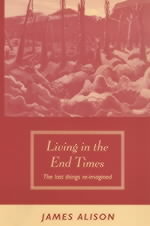
James Alison may just be my favourite theologian of the moment (other contenders are: Stanley Hauerwas, Nicholas Lash and Eugene Peterson [and hey Tim I’ve finally got started on Christ Plays…])
Anyhow, on holiday I read this book of his, which was wonderful – and a perfect antidote to the Christian fundamentalism that I’ve been reading much about recently. Lots of good things about it, much which will inform my sequence of Learning Church talks, and possibly my favourite quotation is this one, but this is also good: “Heaven is a dwelling in the Father which is possible only for those for whom death has come to be a non-definitive, non-toxic part of their story. Once again we are face to face with the central mystery of the Christian faith, which is that Jesus Christ the Risen Lord is risen AS crucified victim. Death is swallowed up by glory.”
His main argument is that, properly understood, the end of the world should transform the way that we think about this one, so that we enter into the way of life that Jesus first imagined to be possible (I think of U2’s ‘When you look at the world’). He draws on Wayne Meeks, arguing that the apocalyptic imagination is characterised by three dualities: cosmic (heaven/earth), temporal (this time/the time to come), and social (good/bad, or righteous/unrighteous). Alison argues that Jesus is using this apocalyptic language (the language of his time) in an eschatological way, ie in a way which first undermines and then overcomes and rejects those dualisms. I think the strongest argument for this is that Christ quite clearly rejects the social dualism, and we should take that rejection as governing his attitude to the other dualisms in the family.
One sequence of thought thrown up from reading Alison: it seems to me that the gay community within the church has something very important to say to the broader body, and one can see the strand of gay sensibility being profoundly rooted in Scriptural ideas, thinking of the church as bride, and therefore Jesus as groom. So if the wider body rejects the gay community then it is undoing itself. This is not to say that all the arguments from the gay perspective are correct – I don’t think they are, even if Alison’s are(!) – but it is undoubtedly the case that I would want to belong to a church in which the gay perspective has an essential part to play, and is not excluded – and that such a church would more adequately represent the Body. Rejecting the gay perspective is, in Alison’s terms, apocalyptic, not eschatological – in other words, it is not fully Christian. I’m persuaded of that.



